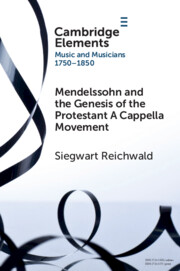Element contents
Mendelssohn and the Genesis of the Protestant A Cappella Movement
Published online by Cambridge University Press: 10 October 2023
Summary
Keywords
- Type
- Element
- Information
- Online ISBN: 9781009119610Publisher: Cambridge University PressPrint publication: 09 November 2023
Bibliography
- 3
- Cited by

